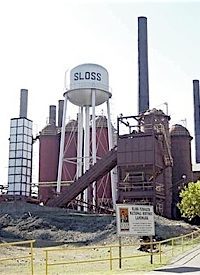
In the battle of environmentalists against business that began years ago in the United States, one of its latest victims is Birmingham, Alabama, coal mine owner Ronnie Bryant. During a recent public hearing in Birmingham — called to consider whether to place a coal mine near a river that serves as a source of drinking water for parts of the Birmingham metro area — Bryant heard accusations by an overflowing crowd that businesses in the area were polluting the drinking water and causing cancer.
Though both state environmental officials and mine operators asserted that the mine would not pose a threat to the drinking water, environmentalists contended that it would.
Birmingham writer and filmmaker David McElroy described the climate of the meeting:
[Bryant] listened to close to two hours of people trashing companies of all types and blaming pollution for random cases of cancer in their families. Several speakers clearly believe that all of the cancer and other deaths they see in their families and communities must be caused by pollution. Why? Who knows? Maybe just because it makes for an emotional story to blame big bad business. It’s hard to say.
After two hours, Bryant approached the microphone and made this announcement:
Nearly every day without fail … men stream to these [mining] operations looking for work in Walker County. They can’t pay their mortgage. They can’t pay their car note. They can’t feed their families. They don’t have health insurance. And as I stand here today, I just — you know — what’s the use?
I got a permit to open up an underground coal mine that would employ probably 125 people. They’d be paid wages from $50,000 to $150,000 a year. We would consume probably $50 million to $60 million in consumables a year, putting more men to work.
And my only idea today is to go home. What’s the use? I see these guys — I see them with tears in their eyes — looking for work. And if there’s so much opposition to these guys making a living, I feel like there’s no need in me putting out the effort to provide work for them. So … basically what I’ve decided is not to open the mine. I’m just quitting. Thank you.
McElroy says of the scene in his blog:
If it had been a scene in [Ayn Rand's novel] Atlas Shrugged, the guy would have disappeared into the secrecy of Colorado with a shadowy figure who we would later learn to be John Galt.
According to McElroy, Bryant is reminiscent of “a southern version of Ellis Wyatt from Ayn Rand’s novel.”
While some may have perceived Bryant’s words to be simply an impassioned impromptu evidence of frustration, when contacted a week later by The Blaze, Bryan remained just as resolute about giving up on his business endeavor, saying that it was not worth his time, money, and the “regulatory hassle” to open up a new mine. He added,
If they [federal government officials] want to create jobs, provide health insurance, and increase revenue, they need to back down on the regulatory burden. It’s like pulling an iron ball with a chain. I’m not saying to make it go away — just the stuff that’s not pertinent or useful.
Commenting on the meeting’s outcome, McElroy wrote:
What I saw today is a broken process and a sham. We all want a decent environment in which to live, but when various people at a public meeting — including federal officials and community members — talk about “environmental justice” and make it clear that their intent is to make it harder for businesses to operate, well, I can see why a businessman would decide to quit. I consider myself an environmentalist — because I want to live in a safe, secure, clean world — but what I saw isn’t reasonable concern for the environment as much as it’s an ideological agenda.
Bryant bemoaned the fact that though America has abundant natural resources, it is being left in the dust by other nations with less strict environmental regulations. He contends that in the effort to protect wildlife, "people are becoming the endangered species.”
Photo: Historic Sloss Furnaces in Birmingham.




